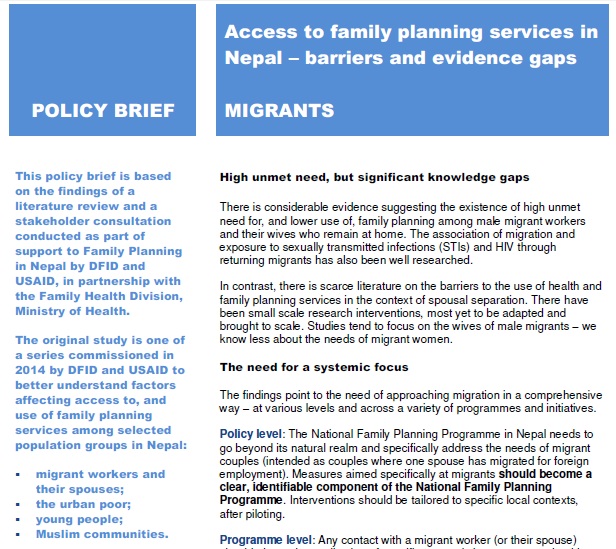
MIGRANTS
There is considerable evidence suggesting the existence of high unmet need for, and lower use of, family planning among male migrant workers and their wives who remain at home. The association of migration and exposure to sexually transmitted infections (STIs) and HIV through returning migrants has also been well researched. In contrast, there is scarce literature on the barriers to the use of health and
family planning services in the context of spousal separation. There have been small scale research interventions, most yet to be adapted and brought to scale. Studies tend to focus on the wives of male migrants ‒ we know less about the needs of migrant women. The findings point to the need of approaching migration in a comprehensive way ‒ at various levels and across a variety of programmes and initiatives. Policy level: The National Family Planning Programme in Nepal needs to go beyond its natural realm and specifically address the needs of migrant couples (intended as couples where one spouse has migrated for foreign employment). Measures aimed specifically at migrants should become a clear, identifiable component of the National Family Planning Programme. Interventions should be tailored to specific local contexts, after piloting. Programme level: Any contact with a migrant worker (or their spouse) should trigger the application of specific protocols by government health workers, health volunteers and private family planning providers. If they already exist, such protocols should be revised and updated. For example, women should be asked early on whether their husbands are migrants, and if so: Does the couple want more children? Are they using contraceptives? Would they like advice on contraceptive options and protection from STIs? Men should be asked if they are migrants, and if so offered counselling on STIs and HIV and on the adoption of an appropriate family planning method (both by husband and wife). Service delivery level: Much can be done by public and private providers to increase the availability of all contraceptive commodities and to improve the quality of care. Quality improvement efforts should be targeted at improving the training of health care providers and at removing misconceptions and attitudes that may stigmatise wives of migrants using family planning while their husbands are away. Appropriate counselling skills among health workers and volunteers are crucial. Community level: Interventions should focus on increasing awareness about family planning in the context of migration, and on modifying attitudes about the use of family planning by migrants’ wives that can result in prejudice and stigma. FCHVs should be part of such efforts by targeting specific information and advice to households with migrant